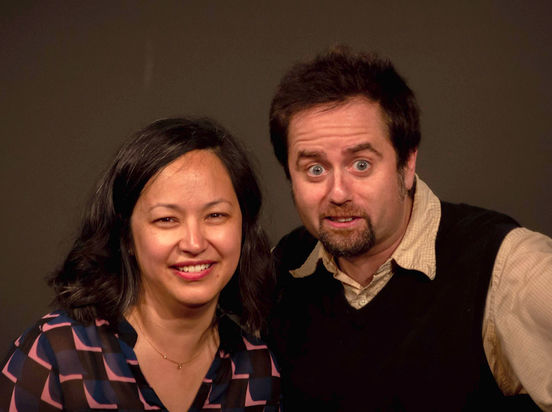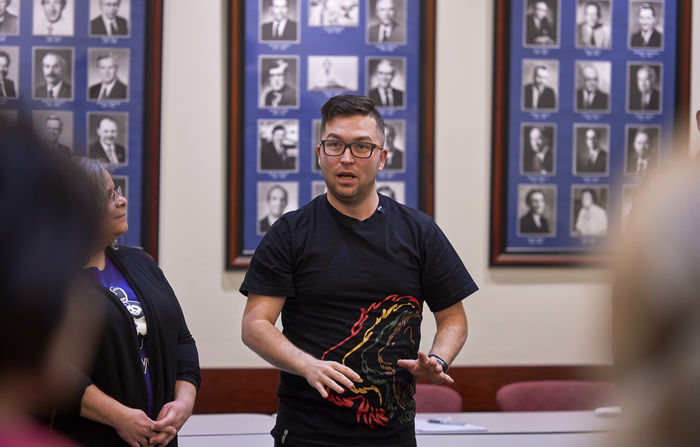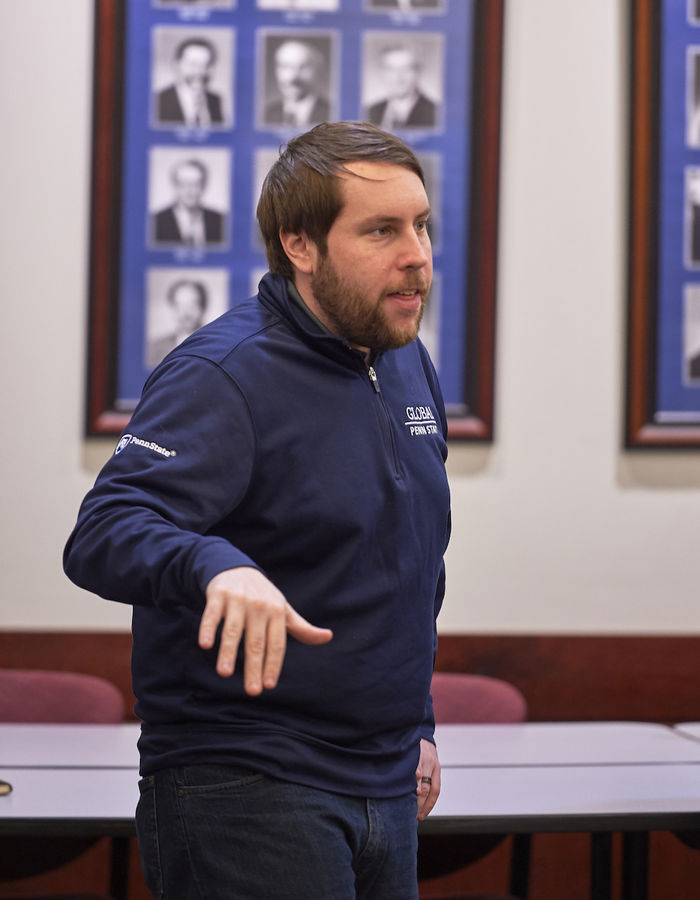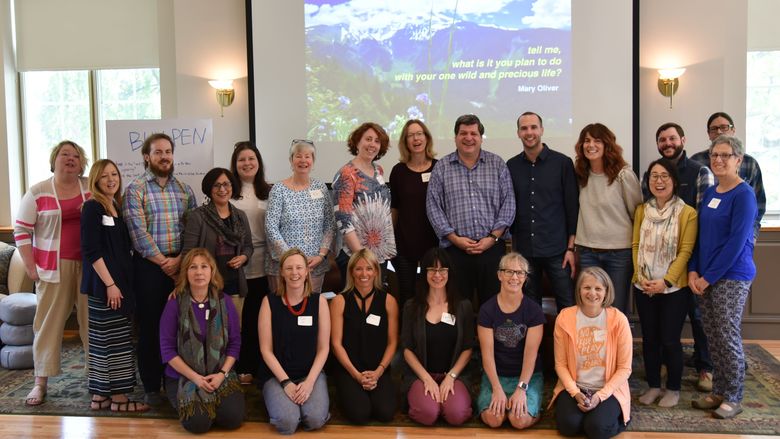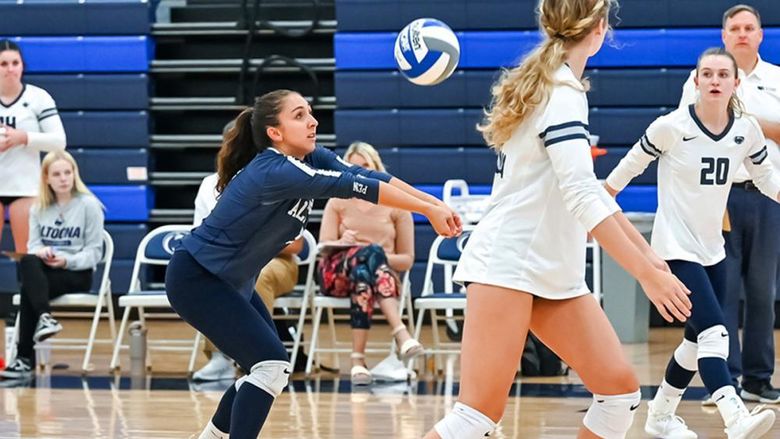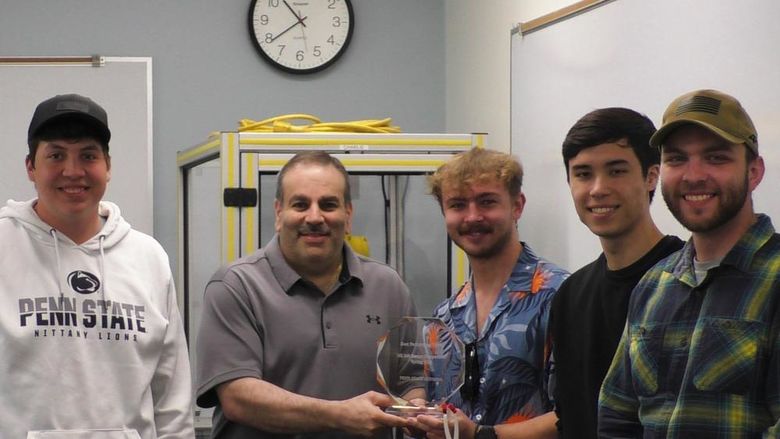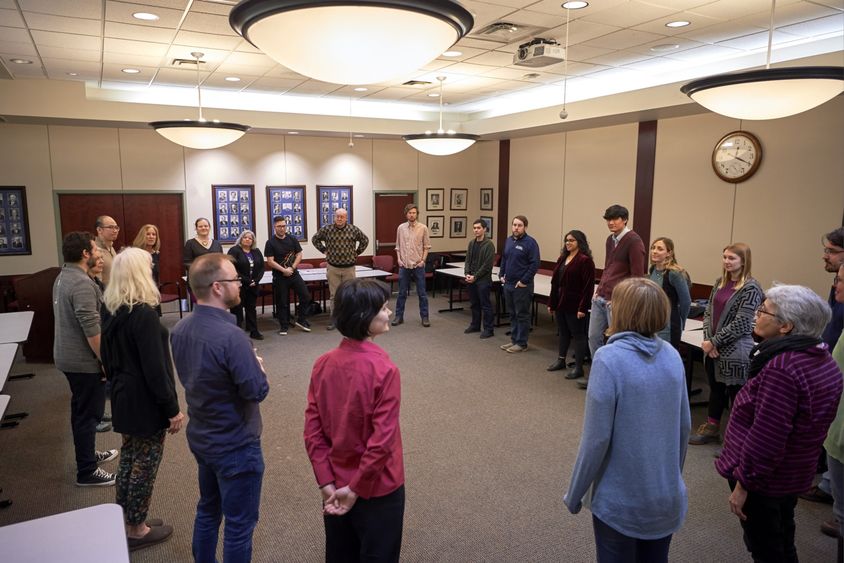
Penn State faculty and staff participate in a workshop led by Nathan Rufo and James Tierney of Happy Valley Improv.
UNIVERSITY PARK, Pa. — Penn State faculty Andrea McCloskey and Sam Tanner are quite serious about the often comedic artform of improv. They are two of the four founders of Happy Valley Improv, and behind the performative emotions the two are whittling away at how their artform can serve to transform teaching in the classroom.
The two are actively publishing on the subject, aided by their stage comrades who at the same time are working to expand the business and influence of the group. They’ve had little trouble finding willing participants in the Penn State and State College communities and their workshops appear to be growing in popularity.
Back in 2017 Tanner, McCloskey and co-founders James Tierney and Nathan Rufo approached the Schreyer Institute for Teaching Excellence in hopes of securing a grant to teach an 8-week workshop centered around improv and its possible effects on teaching in the classroom. Tierney, an assistant teaching professor of economics at Penn State, said he thought it was a big ask for participants to commit to two hours per week for eight weeks then, at the end, put on a performance for friends and family.
The four improv company founders told the Schreyer Institute they needed eight people minimum to make it worthwhile, and that 16 would be ideal. Sixty-four professors and graduate students registered.
Improv and teaching
“On some basic level, improv teaches us how to reimagine power dynamics with groups, how to participate in them differently, but not loosely,” Tanner said during an interview at Webster’s Bookstore in downtown State College.
The assistant professor of literacy education at Penn State Altoona is a self-described introvert who has been involved with improv for more than 15 years, back to his days living and working in Minneapolis in his early 20s.
“People often think that improv is just this ‘free-flowing creative say or do whatever you want,’ but that couldn’t be further from the case and that might be what draws introverts to it,” he said.
Sitting across from Tanner was McCloskey, an associate professor of education at Penn State and also an improv-practicing introvert. The two talked about why professors seemed to be so drawn to their beloved artform.
“Improv, I think, teaches you to give up the desire to control and to manage.”
— Sam Tanner, assistant professor of literacy education, Penn State
Tanner and McCloskey said they are just beginning to scratch the surface of the topic, but speculated that one reason could be people are looking to counter the fear and anxiety that comes with teaching. Sometimes, they explained, strange things happen in the classroom and it can be hard to move on from a comment out of left field. The best thing in the situation could be to build upon the strangeness, just as they do in improv with one another. Most fans of comedy and improv probably know the concept of “Yes, and …” a tenet of the artform that calls for performers to accept a moment and build upon it instead of trying to control the situation.
“Improv, I think, teaches you to give up the desire to control and to manage,” Tanner said.
That doesn’t come without work, however. Tanner and McCloskey explained that improv doesn’t allow a person to hide behind their title, experience, their computer or even their cup of coffee. Participants are thrust into a totally new space, miles from any sort of comfort zone.
“You’re very vulnerable and exposed, in a good way,” McCloskey said. “I think improv teaches us how to be brave. It teaches us courage. It lets us exercise that muscle in an embodied, physical way.”
McCloskey and Tanner said fear and anxiety associated with classroom time was just part of it. There are also the professional demands, the evaluations, and the expectations of professors in various fields. An anonymous quote from a workshop attendee reads “I have become more open to joy [since participating in the 8-week workshop]. I thought I needed to embody anxiety to be considered a serious pedagogue, or even someone worthy of respect.”
“It seems like academia is anxiety-producing,” Tanner said. “It’s pretty scripted in terms of what you should or shouldn’t be doing.”
McCloskey and Tanner said there isn’t much academic literature out there related to improv and its possible benefits to teaching. Tanner described their scholarly work about improv as “pushing toward a theoretical framework for accepting what’s happening at the moment.”
Sometimes they are asked how someone would know if they were doing improv correctly, or if a scene was good or not.
“It’s meaningless to ask ‘Was that improv scene good or bad?’ That’s like asking if the cake is loud,” McCloskey said.
She explained that worrying about whether a scene was “good” or not takes the performer out of the performance, and they are no longer present with others, where the real work is done.
“Improv teaches us, allows us, to be ourselves and be our truest, best selves,” she said. “By playing characters we are discovering how complex we are.”
That complexity can show itself through some tough issues. Tanner also is working on creating an anti-racist theatre pedagogy and “engaging people about serious issues through something that’s playful.”
“Of course there’s a danger there,” he said. “The things that emerge could be visceral and people can have reactions.”
That’s when a good guide experienced in improv can make the difference. It’s important to have someone who doesn’t try to control the situation, but takes what is inside of participants and figures out how to work with it, he said.
Building a business
Happy Valley Improv has generated a ton of local attention and press in the last two years: They have been featured in Penn State News, Town&Gown Magazine, Centre Daily Times, Daily Collegian, WTAJ, WBLF and Onward State and Statecollege.com. They also had members appear on the podcast Happy Valley Hustle and Schlow Library podcast.
The group started selling out its monthly shows at the State Theatre and so began putting on a second.
“We would love for Penn State, in the future, to be the home of improv and pedagogy.”
— James Tierney, assistant teaching professor of economics, Penn State
It’s a long way from the first practices in a church basement in 2016. Tierney said they first realized there was a high demand for improv classes among professors during their eight weeks of workshops, also held at the State Theatre. Right now Happy Valley Improv is nomadic, he said, and they have no overhead and a freedom to go wherever they would like.
But Tierney said the group is kicking around larger dreams, such as hosting an improv conference. Their fourth founding member, Rufo, also is a Penn State employee, in Global Programs marketing and communications.
“We would love for Penn State, in the future, to be the home of improv and pedagogy,” Tierney said. “There are other pockets of people that are doing very similar work to what we are doing, just not at the company and professional level.”
So far Happy Valley Improv has done dozens of workshops at Penn State, in the corporate world and at the State Theatre. Sometimes they last only about an hour, such as during the Innovative Teaching at Penn State Brown Bag Lunch series organized by Bill Goffe, associate teaching professor of economics, and Josh Wede, associate teaching professor of psychology.
There’s still plenty of ground to cover for Happy Valley Improv and its scholars. For example, they are currently working with a colleague who specializes in biobehavioral health, to explore measuring cortisol level changes resulting from participation in improv.
But even though they are looking at improv through scientific and academic lenses, Tanner said it is still important to actually perform improv for themselves.
“I think it’s a mistake to think we can talk our way through things rather than doing our way through things,” he said. “Improv brings the body, and brings the motion, and brings surprise into it.”
Angela Linse, associate dean and executive director of the Schreyer Institute for Teaching Excellence, said that the Schreyer Institute is seeing increased interest in teaching and learning scholarship from the large group of teaching faculty at Penn State. Last fall, Laura Cruz, associate research professor of Teaching and Learning Scholarship (TLS) joined the Institute to advance this kind of scholarship at Penn State.
Linse said faculty such as those involved in Happy Valley Improv are helping to put Penn State on the TLS map.
“The ‘Improving Pedagogy through Improv Theatre’ grant proposal was outstanding in its creativity and potential impact on Penn State students through its multi-campus and multi-college collaboration,” Linse said. “The proposal also had clear and observable objectives for faculty participants.”
Even though faculty were asked to invest significant time, Linse said the project exceeded expectations.
“Given that faculty time is scarce, we could not have predicted the enormous success of this project,” she said. “The faculty have exceeded our expectations in maintaining, and increasing, interest among faculty through participation in the ongoing Improv Faculty Teaching Community.”
Jacqueline Gianico is the associate director of academics at the Intensive English Communication Program at Penn State and an associate teaching professor of applied linguistics. After attending the Schreyer grant-funded 8-week workshop with Happy Valley Improv and joining them for subsequent events, she said her experiences have prompted her to design an improv course focused on English as a second language for international community members, and create an improv club for her program.
The workshops, she said, helped her see the importance of “presence” in the classroom, and accepting and building upon the present moment.
“As a language teacher, I feel lucky that many improv techniques and games translate very well in the classroom space,” Gianico said. “Something happens to human beings when they get up on their feet and have a task to accomplish together … it’s not something that often happens in the traditional teacher-fronted classroom. Some of my best feedback from students comes from the work we do in ‘the circle’ which was inspired by a lot of the work we did in the [workshop] series.”
The Schreyer Institute for Teaching Excellence is part of the Penn State Office of Undergraduate Education, the academic administrative unit that provides leadership and coordination for University-wide programs and initiatives in support of undergraduate teaching and learning at Penn State. Learn more about Undergraduate Education at undergrad.psu.edu. Sign up for UE Headlines for the latest news.
